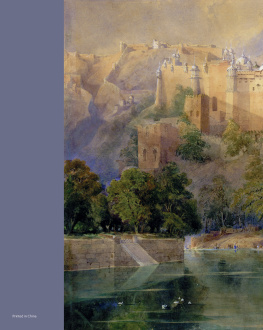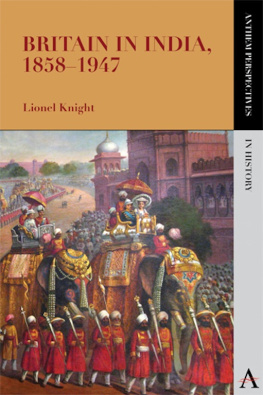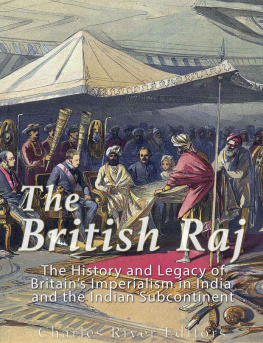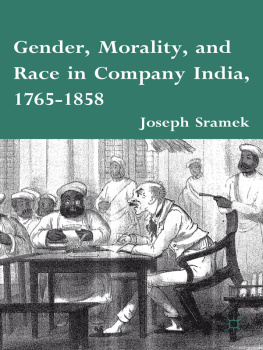| Note: | Images of the original pages are available through Internet Archive. See https://archive.org/details/indiaunderbritis00wheerich |
Transcriber's Note:
Sites of corrections made are indicated by dotted lines under the text. Scroll the cursor over the underlined text and the original text will appear.
The book cover image was created by the transcriber and is placed in the public domain.
INDIA UNDER BRITISH RULE
By
J. Talboys Wheeler
BY THE SAME AUTHOR.
MADRAS IN THE OLDEN TIME, 1639-1748. 3 vols. sm. 8vo. Madras, 1861-62.
EARLY TRAVELS IN INDIA. First Series, comprising Purchas's "Pilgrimage" and the "Travels of Van Linschoten." 8vo. Calcutta, 1864.
EARLY TRAVELS IN INDIA. Second Series, comprising Sir Thomas Roe's "Embassy to the Great Mogul" and Fryer's "Travels in India." 8vo. London, 1873.
HISTORY OF INDIA FROM THE EARLIEST AGES. 5 vols. 8vo.
Vol. I. The Mah Bhrata and the Vedic Period. Thick 8vo. Map. 1867.
II. The Rmyana and the Brahmanic Period. Thick 8vo. Map. 1869.
III. Hindu, Buddhist, and Brahmanic Revival. 8vo. Map. 1874.
IV. and V. Mohammedan Rule. 2 vols. 8vo. 1876-82.
SHORT HISTORY OF INDIA, and of the Frontier States of Afghanistan, Nipal, and Burma. Thick-crown 8vo, with Maps and Tables. Macmillan and Co. 12s. 1880.
HISTORY OF THE IMPERIAL ASSEMBLAGE AT DELHI, held on the 1st of January, 1877, to celebrate the assumption by Her Majesty Queen Victoria of the Title of Empress of India; with Historical Sketches of India and her Princes. Royal 4to, with 13 Portraits, Map, and 17 Illustrations, chiefly by Photographs. 1877.
EARLY RECORDS OF BRITISH INDIA; a History of the English Settlements in India. 8vo. Calcutta, 1878.
JOURNAL OF A VOYAGE UP THE IRRAWADDY TO MANDALAY AND BHAMO. 8vo. Rangoon, 1871.
TALES FROM INDIAN HISTORY. 12mo. 1881.
GEOGRAPHY OF HERODOTUS, Developed, Explained, and Illustrated from Modern Researches and Discoveries. Thick 8vo, with Maps and Plans. 1854.
LIFE AND TRAVELS OF HERODOTUS. 2 vols. post 8vo. 1855.
ANALYSIS AND SUMMARY OF HERODOTUS. Post 8vo. Bohn's Philological Library. 1852.
ANALYSIS AND SUMMARY OF THUCYDIDES. Post 8vo. Bohn's Philological Library. 1852.
INDIA
UNDER
BRITISH RULE
FROM THE
FOUNDATION OF THE EAST INDIA COMPANY
BY
J. TALBOYS WHEELER
LATE ASSISTANT-SECRETARY TO THE GOVERNMENT OF INDIA, FOREIGN DEPARTMENT,
AND LATE SECRETARY TO THE GOVERNMENT OF BRITISH BURMA.
AUTHOR OF "HISTORY OF INDIA FROM THE EARLIEST AGES,"
INCLUDING THE "MAHA BHARATA" AND "RAMAYANA,"
"A SHORT HISTORY OF INDIA,"
ETC., ETC.
London
MACMILLAN AND CO.
1886
The Right of Translation and Reproduction is Reserved.
Richard Clay & Sons ,
BREAD STREET HILL, LONDON,
Bungay, Suffolk.
TO
SIR CHARLES TREVELYAN, Bart. ,
WHO OPENED
THE OLD MADRAS RECORDS TO THE AUTHOR
IN 1860,
This book is Dedicated.
PREFACE.
A hundred years ago, when the lively Miss Frances Burney was weeping over the wrongs of Warren Hastings, and the learned and portly Gibbon was still lamenting that he had not entered on an Indian career, there were people in the British Isles who knew something of Indian history. They had picked up information respecting Indian affairs from the speeches of the grave Edmund Burke, the eloquent Charles James Fox, and the impassioned Richard Brinsley Sheridan. The facts may have come second hand, and been more or less distorted by the jealous and bitter fancies of Sir Philip Francis, the reputed author of the Letters of Junius; but facts or fables, they served to enlighten the British public on the Indian questions of the day.
During the present century, the march of intellect has turned away from India, except as regards an outlet for cotton goods, a field for speculation in railways and teas, or a provision for younger sons in the "Indian civil." Within the last few years, however, there has been a change for the better. The British public has been alarmed at the fall in silver. It has been cheered by the proposal to place British-born subjects under the magisterial jurisdiction of Hindus and Mohammedans. It has been aroused by the prospect of a war with Russia in Central Asia; but it has been comforted by the restoration of the fortress of Gwalior to Maharaja Sindia. Moreover, Burma is no longer confounded with Bermuda, and no one groans over the annexation of the country, or the destruction of brigandage by the new rulers. Still there is room for more knowledge. The author, however, has before him a letter from an old friend in high position in India, who tells him plainly that the British government does not want history. Accordingly, the present work is not called a History of India, but India under British Rule.
More than one British ruler in India has, however, sinned against history, and might well like to shut it up with confidential minutes and secret negotiations. Within the present century, India has been desolated by wars as cruel as those of the Heptarchy, and as unmeaning as those of the White and Red Roses. Within the present generation, it has been distracted and tortured by a military revolt, created by a scare about greased cartridges, but leading to crimes more horrible than those of the French Revolution. Yet Anglo-Indian statesmen have been known to ignore the past, and to propound schemes for India that would be too advanced for any European nation excepting Great Britain. They have blinded themselves against history, like ostriches burying their faces in the sand. They have dealt with India, as the German philosopher dealt with the "camel," not by the facts before them, but out of the sublime depths of their moral consciousness, stirred up by a political caucus, or a philanthropic gathering in Exeter Hall.
Controversy and fault-finding are to be deprecated. But reform is only possible after a due consideration of what has been accomplished up to date by British rule in India, and of the flaws and faults in the existing constitution.
It will be seen from the first chapter, that the British traders of the seventeenth century, who established factories, built fortresses, and created manufacturing towns, also attempted to introduce representative and municipal government into the East India Company's once famous city of Madras. The second chapter reveals the fact that the acquisition of Bengal in the eighteenth century was not the work of ambition, but an act of self-preservation. The third chapter shows that the peace of India could not have been maintained in any possible way except by the establishment of British supremacy as the paramount power. The fourth chapter proves that the first Afghan war, needless as it turned out to be at the time, was the outcome of Russian ambition which dates back to the times of Peter the Great and Nadir Shah.
The story of the sepoy mutinies of 1857 occupies a considerable space in the present volume. It is not a mere narrative of military revolt, but a revelation of Asiatic nature; a lesson which every Anglo-Indian statesman must study, if he would avoid defeat or failure. The masses in the British Isles may read Biblical accounts of rebellion and massacre, or the story in Josephus of the atrocities of Herod the Great; but very few seem to realise the fact that they are reading Asiatic history, which has no reflex in Europe, nor in any country under European rule except British India. The horrible intrigues and murders in the household of Herod; his frantic passion for the fair Mariamne; the malicious lies of Salome; the assassination of Mariamne by her jealous and infuriated husband; the alternations in the mind of Herod as regards Cleopatra, whether to accept her love or murder her;find no parallels in European history, excepting perhaps in Turkey, or in the Russian court of the last century.









